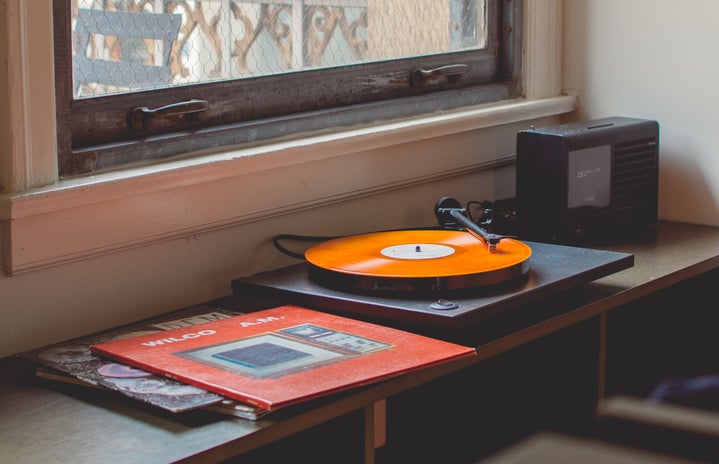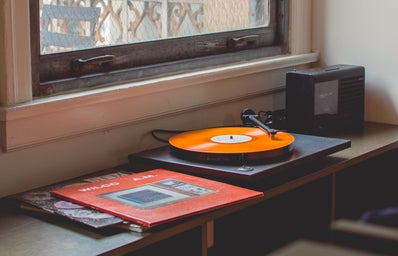A few times a year, I will find a new artist to stream non-stop until they become either a comfort artist or someone whose voice I never want to hear again. Back in quarantine, it was Harry Styles, this past fall it was Boygenius, and right now it is Gracie Abrams. Specifically, I cannot stop streaming her new album , Good Riddance.
Released on February 24, 2023 through Interscope Records, Good Riddance is a 12–track album spanning nearly 53 minutes. Written alongside(and also produced by) Aaron Dessner, Abrams’ debut full–length album dives into growth and vulnerability. The vocals are airy and almost haunting, and they definitely help solidify the vibe of the album.
While Good Riddance does not introduce the world to a new side of sad indie music, I would say it has earned its spot as a solid bedroom pop album. Although some of the songs on the album did take a while to grow on me, there are none I consistently skip. The lyricism gets the job done, but that does not mean it is necessarily extraordinary. However, I do not think that makes it lack relatability; in a rather straightforward way, Abrams tells a story of the trials and tribulations that we face as we enter adulthood. Considering that her primary demographic is teenage girls and young women, her storytelling is quite relatable despite the lack of complex lyricism.
“Difficult” was released as a single way back in October, but I didn’t hear it until I listened to the album. I really relate to this track, probably because it is packed full of lyrics that describe experiences with young love and self–discovery not far from my own.
I especially enjoy this track because of how it speaks to the way relationships affect our self–image. After spending the first verse describing the things she lacks, such as a true fondness for her partner and a solid relationship with her parents, she spends the chorus questioning why it has to be so hard to feel comforted and supported: “Oh, I know/Spiralin’ is miserable/I should probably go back home/Why does that feel difficult, difficult?” She knows she just wants to go home and feel better, so why can’t she?
By the time she gets to the bridge, Abrams appears to be answering her own questions. In saying that “[she’s] been drinkin’? And stayin’ up too late, relivin’ bad decisions/[she] thought eventually, [her] ranting here would fix it,” she reveals that the mental toll of relationships and big changes is so much harder to address. Even if going home brings her some level of comfort, she still has to address the mental turmoil she faces.
Another track that really stood out to me is “Fault line.” On the surface, it seems like Abrams is saying that she would not be affected if the relationship she sings about were to end. We see this in the opening line of the song when she sings, “You could go and I won’t even feel it/Wouldn’t hold up the road when you’re leavin’.”
As the track continues, we come to find that she feels this way because of the other person’s apparent lack of empathy and understanding for her. This is evident in the chorus when she sings, “I know you’re a fault line, but I’ll break too/Crackin’ at the same time, does it shock you?” It is as though she has dedicated so much of herself to this other person that she does not want to just leave them, but she also knows that they are not nearly as committed to her.
The bridge of this song is a personal favorite of mine. Abrams uses a beautiful metaphor to express how she feels: “And all of my imaginary friends are scared of you/I’ve gone and cried to them in our bedroom.” Given that imaginary friends are just figments of our individual imaginations, we are actually hearing Abrams confess that there are no sides of herself that enjoy this other person and her relationship with them. In fact, she admits that all parts of her are scared of them.
The last song on the album, titled “Right now,” beautifully captures the feeling of longing for one’s old life. To me, it sounds like Abrams is at a standstill as all of her memories flood her mind. From her kitchen to her family to the ocean, she recollects all of the parts of growing up that she yearns for as she enters adulthood.
Given that college is often seen as the transition period from youth into adulthood, I really resonate with this track. Although the specific lyrics are more related to Abrams’ experiences than mine, the overall mood and theme of the song reminds me that I’m not the only one facing discomfort as I grow up.
By the end of the song, it feels like Abrams has come to terms with growing up; even though she admits to being fearful of losing relationships, she also sees it as an opportunity to live how she wants. When she says, “Left my past life on the ground/Think I’m more alive somehow/I feel like myself right now,” she highlights just how liberated she feels in growing and evolving.
Although there are times when the lyricism comes up a bit short, I would argue that Gracie Abrams’ Good Riddance is an overall solid album. It conveys messages of growing up and navigating the complexities of relationships that nearly everyone can relate to. As I mentioned, “Difficult,” “Fault line,” and “Right now” are tracks that I found myself especially resonating with. I highly encourage you to give the album a listen for yourself, as I’m sure you will also find some that stand out to you.



